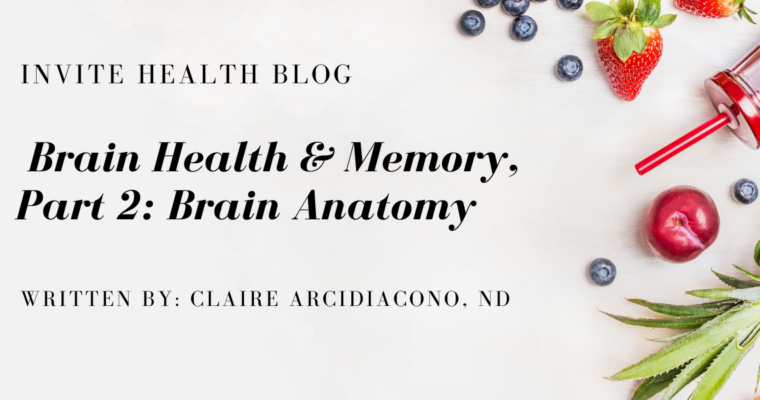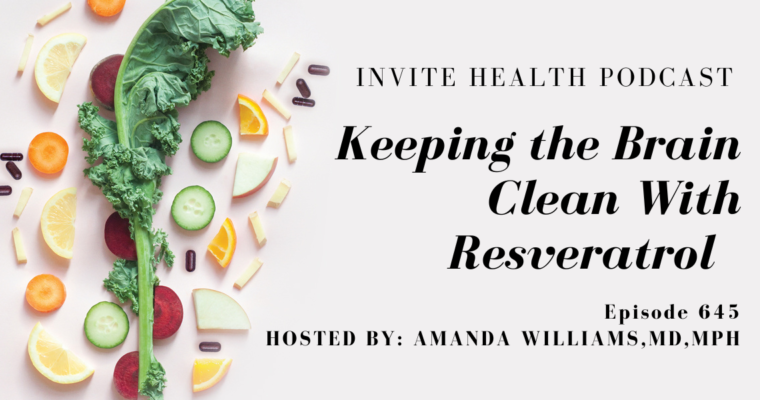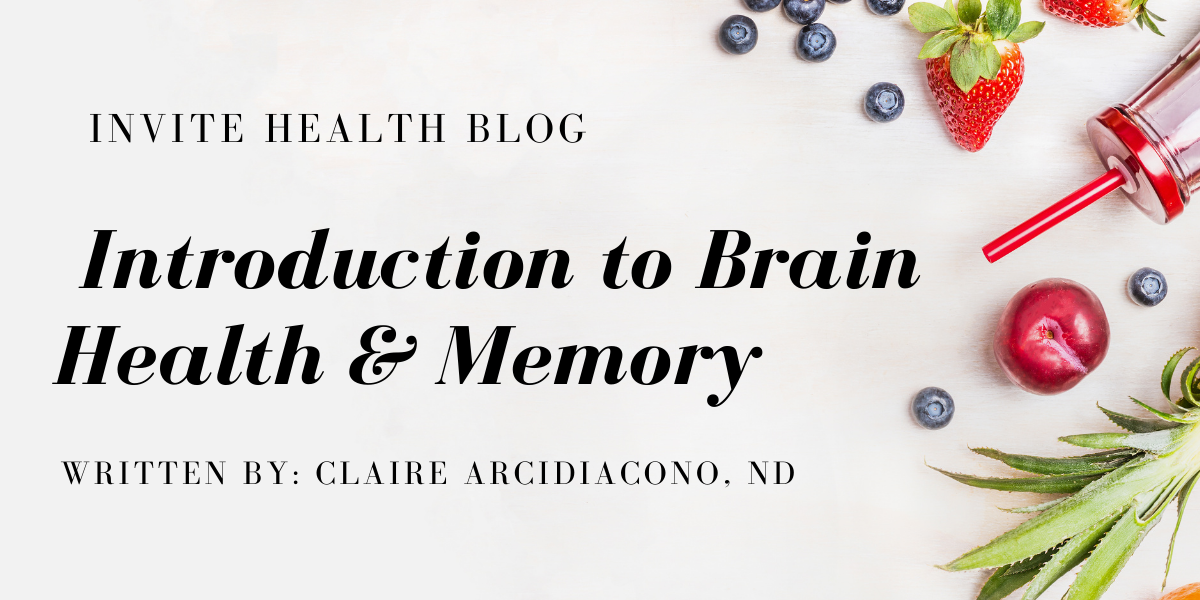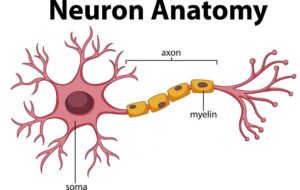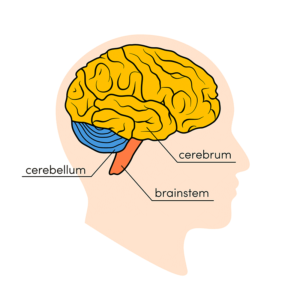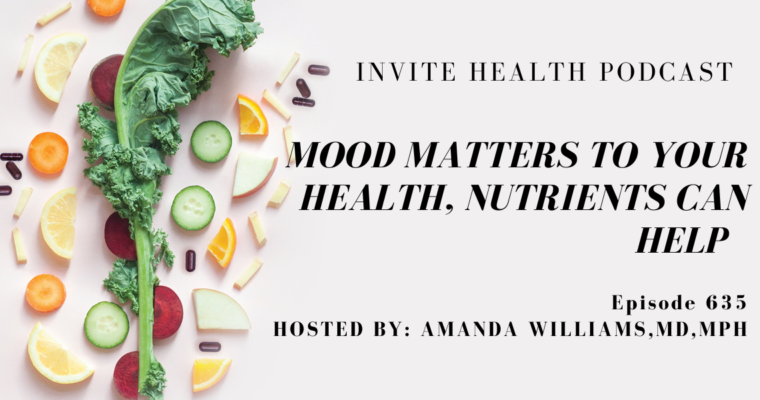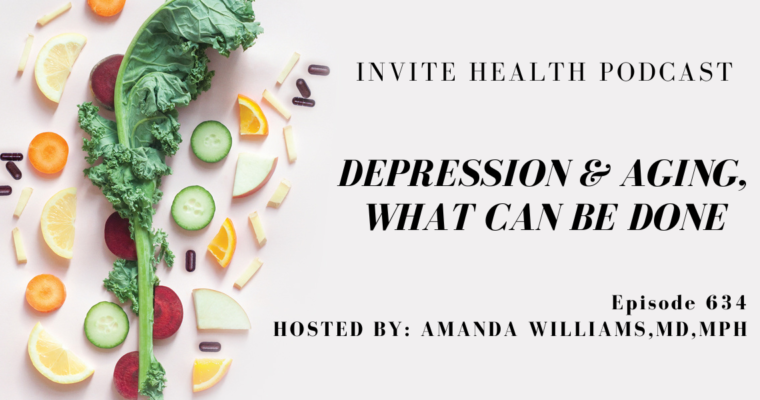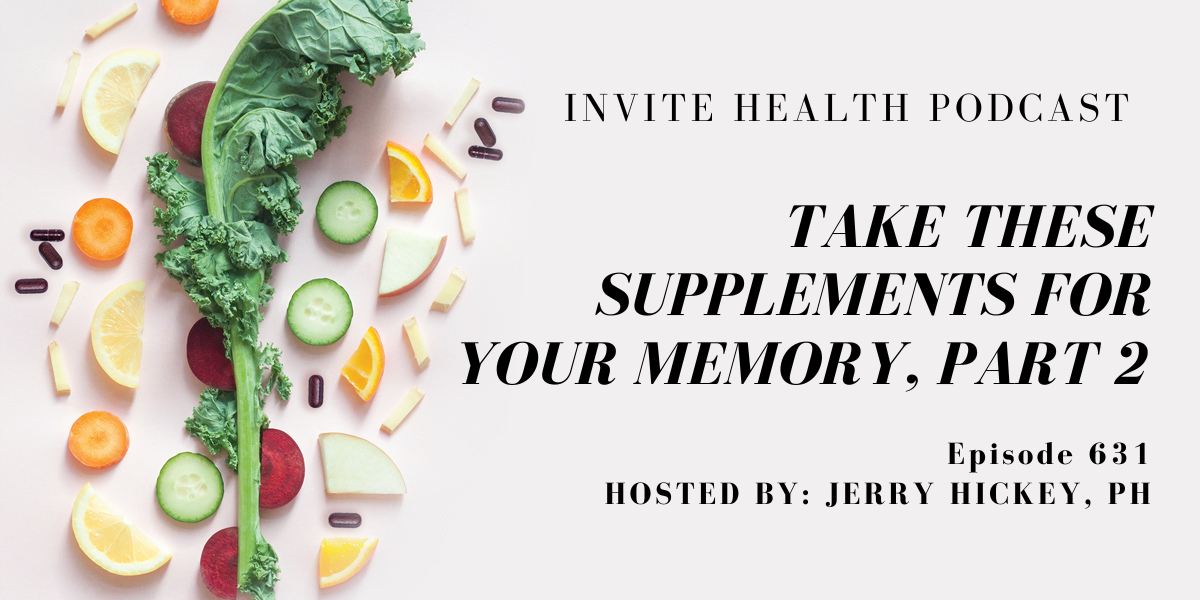Subscribe Today!
Please see below for a complete transcript of this episode.
TAKE THESE SUPPLEMENTS FOR YOUR MEMORY- PART 2. INVITEⓇ HEALTH PODCAST, EPISODE 631
Hosted by Jerry Hickey, Ph.

*Intro Music*
InViteⓇ Health Podcast Intro: [00:00:04] Welcome to the InViteⓇ Health Podcast, where our degreed health care professionals are excited to offer you the most important health and wellness information you need to make informed choices about your health. You can learn more about the products discussed in each of these episodes and all that Invite Health has to offer, at www.invitehealth.com/podcast. First time customers can use promo code podcast at checkout for an additional 15% off your first purchase. Let’s get started. † [00:00:34]
*Intro Music*
Jerry Hickey, Ph: [00:00:41] Welcome part two to my podcast episode, “Take these nutrients for your memory”, or if we take these supplements for your memory, same thing. I discussed in pretty good detail research on vitamin B6, Vitamin B12 and folate for retaining your memory, in part one of the episode and I also did some discussion of Vitamin D. Now I’d like to complete this conversation. There are many different aspects of health that can affect your memory as you age, and that can literally increase the risk of dementia if you don’t handle it well. So welcome to part two of my podcast. My name is Jerry Hickey. I’m a nutritional pharmacist, I’m the senior scientific officer over here at Invite. You can find all of our episodes, our podcast episode for free, wherever you listen to podcast or just go to our homepage, invitehealth.com/podcast. You can also find Invite on Twitter, Instagram and Facebook at Invite Health. All of the information on today’s podcast episode will be listed in the description. So, I mentioned briefly some research on vitamin D in part one of this episode, in part one of this podcast. But there’s a lot of evidence for vitamin D and brain health, and there’s a lot of evidence for Vitamin B12 and vitamin B6 and folate and brain health. We’re going to go a couple of steps beyond that now. But there’s also new research on vitamin D and your risk of dementia. It’s from the U.S. National Alzheimer’s Coordinating Center, and the research was reviewed by the University of Calgary, Hotchkiss Brain Health Institute and the University of Exeter, which would be in England. It’s in the recent issue of the Journal of Alzheimer’s, of the Alzheimer’s Association, a diagnosis, disease and monitoring. So that’s hefty. That’s not the kind of thing you want to read, it gives you bad dreams. But, you know, when you’re doing this kind of podcast, you want to read these journals. But they looked at our research, including 12,400 participants. They followed them for ten years and they found that vitamin D helps keep you dementia free. I mean, there was a strong association there. Vitamin D reduced the risk of developing dementia by 40%. So, I thought I’d just add that because that’s more new research that came out. There’s so much research on B12, folate and B6 and memory. So now let’s look at things that protect the brain and things that can damage the brain. A very poor diet is very bad for the brain on many levels, it allows the brain to become inflamed because it’s not supporting the supply of healthy antioxidants for the brain and it’s not nourishing the bacteria that live in your intestines. The bacteria in your intestines don’t get into your brain, but they create things out of good, wholesome foods that are good for the brain. So, when you eat a bad diet, like, I mean, you know, diet colas, apple turnovers, French fries, fried foods. When you eat a diet, that’s mostly that kind of food, bad for the brain or if it’s overprocessed food, it’s just lacking nutrition, over processed foods or a lot of those dehydrated foods that you add water to or a lot of those premade foods that you get in the supermarket, much better off with fresh foods. So what foods are good for the brain? Well, you can look at the mind diet. The Mind diet was done by the Rusk Institute over in Chicago, and they have pretty good evidence that it really helps slow down aging in the brain and is very protective for the brain. So, look up the mind diet. It doesn’t tell you exactly how to eat. It tells you what foods to include in your food. So, in the thousands of studies, I’ve read about foods and the brain, green, leafy vegetables, very important for the brain. There are so many things are green, leafy vegetables, glutathione precursors, a little bit of calcium, the mineral, magnesium, lutein, zeaxanthin, those are carotenoid pigments that are good for the eyes and brain, folate. There’s so many different things in green leafy vegetables that are great for the brain and things, including some very esoteric things like glucuronic acid, indole carbinols, sulforaphane and other isothiocyanates, so green leafy vegetables and the cabbage family would have all those things, but also spinach and lettuce. They’re good for the brain. Spinach and lettuce are good for the brain. Green tea is good for the brain. Lots of data on that. Mushrooms. Mushrooms are great for the brain. Blueberries. Berries in general are great for the brain, especially blueberries. † [00:05:49]
[00:05:50] Now, another thing is controlling your blood pressure and controlling your blood sugar. So, if you have diabetes or hypertension, which means high blood pressure, take care of it. It’s very important to get it back under control. Sleep. Sleep is a cycle, and, you know, it’s a couple of hours, the cycle, and you go in and out of REM sleep and deep sleep, which is are very important, these stages of sleep. First of all, you take everything you’ve learned and you kind of coordinate that and start to secure it and better location. In the daytime, when you learn something new, like if you learn something new from me today on this episode, you store it in a temporary holding site called the hippocampus, which is, first of all, it could get filled up, and second of all, it’s a little bit vulnerable to damage losing the memories. So, at night, you move these memories to other areas that are long term memory storage sites. And when you wake up in the morning, so you’re truly learning at night, you’ve heard the information now, but you’re storing it properly tonight when you go to sleep, when you go into deep, very deep, deep stages of sleep, which is called Delta Wave Sleep or non-REM sleep, non-rapid eye movement sleep stages. And it’s important in the morning to give your brain a little time to download this information. So, when you wake up in the morning, don’t grab your phone and start using your thumbs, looking at all these different things. Let the brain kind of wake up and store all this data and, you know, download the data so you truly know it. So that’s one thing. Sleep is really important. But while you’re sleeping, not only are you storing memories properly, you’re repairing the brain. You’re actually creating cognitive reserve and creating new neuron memory thinking cells. You’re releasing growth factors like brain derived neurotrophic factor, a nerve growth factor, that create, they take stromal stem cells, progenitor cells, and convert them into memory cells. And you could do hundreds of those every night. So, you want to get your sleep because you go in and out of deep sleep. So, you want to get 7 to 8 hours. You can get by with six, some people six is fine, six is fine for me, but other people need 7 to 8 hours. But not only do you repair your brain at night to create these new memory cells, and not only do you store the memories properly that you learned the day before, but you also detoxify the brain at night. You have this system called lymphatic system that breaks down plaques and toxins in the brain and removes them at night while you’re sleeping. In the daytime, you can help that out by raising your legs. Like if you’re sitting down, raise your legs, that helps with lymphatic cleansing in the brain a little bit, but it really takes place largely at night when you’re sleeping. Exercise, good quality exercise, a half an hour to an hour every day. It could be a walk. I mean, I walk every day many times. But you also go to the gym. I kayak, I do all these things. † [00:08:41]
NUTRIENTS FOR STRESS AND SLEEP SUPPORT – INVITE HEALTH PODCAST, EPISODE 507>>LISTEN NOW
[00:08:43] Be social, lonely people and people who are not communicating with other people. It’s a problem. It’s a problem for your brain, challenge your brain. I mean, I do, you know, I’m always reading tough studies and I’m always learning, I’m always watching documentaries, etc.. I’m always reading tough books. I mean, challenge your brain. Now, also really kind of don’t overdo the alcohol, you know, a glass of beer once in a while or a glass of red wine once in a while is fine. But you don’t want to overdo the alcohol, it’s not good for your brain. Hearing loss, hearing loss studies are connecting it with dementia. Part of it might be that you’re not as social, you’re kind of socially cut off if you can’t hear. But it seems to be something else, too. It seems like you’re taking parts of your brain should be devoted to other things, and you’re devoting it to trying to listen and hear and decipher what people are saying. So, if you really have hearing loss, it’s very important to get a good quality hearing aid. It’s very important to get a good quality hearing aide. I would actually visit an audiologist, I know you could go online today on your computer, etc., and order hearing aids. You really should work with an audiologist. Now there are supplements that have been shown to be helpful for the brain, Vitamin D, we went over that in the two parts of this podcast episode, Coenzyme Q10, which is important for metabolism in the brain. Vitamin B6, Vitamin B12, Folate, but also Vitamin B2, which is riboflavin and vitamin B3, which could be a niacin or niacinamide, for many reasons, they are important for the brain. Vitamin B1 is important for the brain because it works in a system called the transketolase system that helps control metabolism in the brain and the use of sugar for the brain. The major source of energy for the brain is not fat, it’s not protein, sugar. So, you need B1 to use that sugar properly. Calcium and magnesium protect the brain. Krill oil, there is many studies showings that Krill oil is very good for the brain. Krill oil has a whole bunch of things in it that help you create plasmalogens. So that’s a, that’s a mouthful, plasmalogens. They’re made out of phosphatides, they’re made out of serine, they’re made out of fish oils, they’re made out of choline, all these things are in Krill. And see antioxidant levels really decline in the brain in your fifties and sixties. And this allows free radicals that are generated through the use of oxygen and sugar, combining oxygen and sugar in the brain for energy. That’s the gasoline and the oxygen for the brain, right? Just like a car engine, an old-fashioned car engine uses oxygen and gasoline. You’re using oxygen and sugar in the brain for energy, and these create free radicals, and you need the antioxidants to stop the free radicals, otherwise, the free radicals kill brain cells, damaged blood cells, muck everything up and inflame the brain. Plasmalogens are an alternative source of protection for your brain cells, which is kind of like the secret service, it’s kind of like a bulletproof vest for your brain cells. So, Krill oil, one of the things it does in your brain, it helps you create plasmalogens, it also give you fish oils. Your brain cells are made out of things like fish oils, and it also allows you to create acetylcholine, acetylcholine is an important neurotransmitter in the brain that helps you solve things, that helps you learn, that helps you remember and helps heal the brain when you’re sleeping, by the way. So, Krill Oil has three really good effects on the brain, it gives you fish oils, it helps you create acetylcholine, and it gives you plasmalogens. † [00:12:24]
[00:12:26] Lutein, Zeaxanthin, & mesozeaxanthin, are pigments in green leafy vegetables and corn and to a degree in pistachio nuts, and these are great for your vision and they’re great for your memory, you need them. Vitamin C and vitamin E help protect your brain. So, I’m just giving you a loose synopsis of nutrients study good for your brain. Vitamin C could be synthetic, it’s kind of like this crystalline structure that’s the same as natural vitamin C. You don’t have to pay a fortune for natural vitamin C, save your money, spend it on natural vitamin E, because the natural vitamin E is a completely different structure from a synthetic vitamin E, and it works much better to protect your brain. Now, I’m going to tell you some bonus supplements, probiotics, a good mixture of probiotics. First of all, probiotics help control your appetite when you eat foods, the probiotics help you create pyruvate, pyruvic acid in the upper intestine. When the brain sees that there’s enough pyruvic acid, it shuts down your appetite. You’re not hungry, you’re not overeating, you’re not picking, you’re not eating in between meals because the brain says, oh, you ate enough calories to pyruvate, because you have enough pyruvate. It proves that, if you lack healthy bacteria, you’re not making pyruvate. Second of all, probiotic bacteria work on wonderful fibers and different foods and allows you to create a very important acid called butyric acid. Butyric Acid is important for the intestines, it heals the intestines, it gives the intestines energy and helps you absorb minerals like calcium and iron, calcium and magnesium, etc. Most minerals are absorbed from the upper intestines in the stomach, but if they get passed that, they need help with absorption and the probiotics when they create be butyric acid, it helps you absorb part of these minerals. But the butyric acid, repairs the blood brain barrier in the brain. Your brain has to be protected from toxins. You know, something that might be an irritant in your big toe and your brain could be deadly. So, your brain has this protective barrier inside the blood vessels that keeps bad things out of the brain. It’s not perfect, but it works pretty darn well. It’s called the blood brain barrier. And it tends to get leaky with age. Well, there are certain things that repair the blood brain barrier. One of them is probiotic bacteria, because they take the fiber in foods and they create butyric acid, which helps repair the brain. Secondly, alpha lipoic acid. We’ll go to that in a minute. And thirdly, resveratrol will go into that one also. So probiotic bacteria, they do other things that are important for the brain. They create certain nutrients out of your food that are very important for brain health and your mood and your focus, etc.. † [00:14:59]
[00:15:04] Resveratrol. Resveratrol is found in well, we get it commercially from our Japanese knotweed, which is also called Polygonum Cuspidatum. That’s the one used in a lot of research. And because you get high amounts from this kind of weedy thing and resveratrol does a bundle of things in the brain, it helps repair the blood brain barrier that keeps nasty things out of the brain, but also help. It’s vasoactive, which means it’s good for circulation to boost circulation. Circulation to the brain declines with age, the brain is such a high energy organ that needs, a lot of vitamins and minerals and essential fatty acids and amino acids and all these different things to function properly. So, if you have a breakdown in circulation, bad for the brain. I mean, this is proven, resveratrol helps restore circulation to the brain. There was this study from Australia a couple of years ago where elderly women, about 100 elderly women, were given resveratrol for a couple of years and they found out, that it restored circulation to their aging brain by about 17%. Wow. That’s pretty. I think it was called a washer study. So, a long time ago I read that study. But I know my brain is still working because I remember that study. So, I put a lot of studies showed resveratrol helps restore circulation to an aging brain, like you can see the ones from Georgetown University down in Washington, etc. Resveratrol is very good for the brain. Well absorbed turmeric, turmeric has about 160 ingredients, many of them are good for the brain, like bismuthoxycurcumin, and curcumin, everybody knows curcumin. That’s just one of the ingredients in turmeric. And then there’s aromatic turmerone, which is a fatty acid, an essential oil, actually. And the research shows that turmeric, the whole plant, is very good for the brain. So don’t just get curcumin, but when you get turmeric, it has to be a well absorbed one, turmeric is very poorly absorbed. And turmeric, they’ve shown that, a well absorbed turmeric, rich in curcumin, one, it stimulates memory, it’s good for memory for hours and older people like 6 hours, your memory functions better if you take turmeric with your breakfast. But they also found out it, dependably from about five human clinical trials, it dependably triggers the release of brain derived neurotrophic factor. This is what you release when major nerve growth factors are release, when you go into deep levels of sleep at night, that helps repair the brain and helps you grow new memory cells, so a well absorbed turmeric. Not to mention that turmeric is a great anti-inflammatory in your brain. So, I mentioned resveratrol. I mentioned a well absorbed turmeric, I mentioned probiotics. And then I’m going to mention Alcar and ALA, Alcar is acetyl-l-carnitine. It’s important for metabolism, I mean, it works throughout the body, but it’s really important in the brain. Alcar, helps you create all kinds of neurotransmitters like GABA and acetylcholine and glutamic acid for learning and glutamate for learning and different neurotransmitters for brain energy. But Alcar, also restores metabolism in an aging brain, it allows the brain to take acetyl coenzyme a, a major source of energy throughout the body and bring it into the brain cell and use it for energy. So Alcar, acetyl-l-carnitine, is great for an aging brain. † [00:18:24]
ICYMI:TAKE THESE SUPPLEMENTS FOR YOUR MEMORY, PART 1, INVITE HEALTH PODCAST, EPISODE 630>>LISTEN NOW!
[00:18:24] There was a very interesting study out of Arkansas where there’s a center down there that does research on aging soldiers, and they went to Italy, which has the biggest brain bank in the world, and they found that older, healthy brains had higher levels of Alcar. People subjective memory decline, you know, where they’re forgetting words or forgetting where they are in a conversation. They have a little bit less Alcar, but people who really were losing memory, like those with mild cognitive impairment and those with Alzheimer’s, they were severely lacking Alcar, Alcar is good for the brain. And then there’s alpha lipoic acid. Alpha lipoic acid is an incredible antioxidant. Many antioxidants only work one time like vitamin E or two times like vitamin C. Alpha lipoic acid works four times, so it keeps on recycling all the other antioxidants, and it’s a dependable source of creating the mother of all antioxidants called glutathione, and glutathione peroxidase really helps slow aging process. It really helps protect you from things like cigarette smoke and pollution, etc, and the consequences of viruses in the lungs, etc. But the alpha lipoic acid also helps balance your sugar. It’s very beneficial for healing the liver. It’s both water soluble and fat soluble, so, it gets all over the body and it gets into the brain and it’s very good when you take it with Alcar. There’s a synergism there where they work very well together and they really help restore brain metabolism, brain energy and aging people. So, I just want to give you this further information on brain health. There are other nutrients that are showing they’re good for the brain, like creatine monohydrate. Don’t take that if you have reduced kidney function because it’s excreted by the kidneys. It originally came out of the bodybuilding world because it helps give you power when you exercise, and this is true, and in older people it helps you get stronger. But it also gets into your brain, like if you’re vegan or vegetarian, it’s not just good for brain energy, it’s good for memory. Whereas people who are carnivores or omnivores where they eat meat and vegetables, they eat everything. For them, it’s just good for brain energy. So, it does help the workings of the brain. And I did mention mushrooms, too. Okay, listen, we’re done here. Make sure if you get a multivitamin just to wrap this up, try to get a multivitamin with some coenzyme Q10 in it, because that’s important for the metabolism in the brain. It allows you to use oxygen for energy and it helps clean the free radicals out of your cells in your brain. It works all over the body, but it’s really important for the brain. Make sure you’re getting the active form of B12 called methylcobalamin, it really gets into the brain, it works quite well. Get the active form of folic acid, Folic acid is synthetic, folate is the real name, it’s named after foliage because it’s ubiquitous in foliage. But not everybody converts it to the active form, which is methyltetrahydrafolate and methyltetrahydrafolate, MTHF, so make sure that you’re getting that form in your multivitamin. Try to get a multivitamin with some lutein and zeaxanthin from natural sources and it’s great for the brain, some natural vitamin E, even some tocotrienols, which is a more advanced form of vitamin E that’s super powerful and protecting your brain. All these things are important for the brain. So, get a good multivitamin. That’s a basic thing you could do for your brain, and it’ll have some vitamin D in it as well. It’ll have the B12, the folate, the B6, the, B2, the B3, the B1. All these things that are necessary for the brain and make sure you’re getting fish oil somehow by either taking a fish oil capsule that’s fresh, make sure it’s fresh or eating fresh fish or take Krill, which is, you know, I eat fresh fish and I take Krill, that’s how I do it. Okay. For all of us at Invite Health, this is nutritional pharmacist Jerry Hickey. Wishing you optimal health now and well into the future. I want to thank you for listening. You can find all of our podcasts for free wherever you listen to podcast or just go to invitehealth.com/podcast, you could subscribe and leave a review, I’m told, it’s very helpful. And you can also listen to Invite on Facebook, Twitter and Instagram at Invite Health. And I want to thank you for listening and Jerry Hickey signing off, have a great day. † [00:18:24]
*Exit Music*


